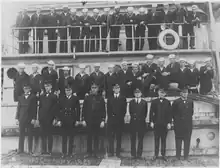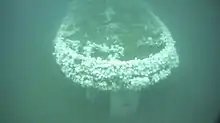USS Conestoga (AT-54)
The second USS Conestoga (SP-1128/AT-54) was an ocean-going tug in the United States Navy. Commissioned in 1917, it disappeared in the Pacific Ocean in 1921. The fate of the vessel was a mystery until its wreck was positively identified in 2016.
_at_San_Diego_c1921.jpg.webp) Conestoga in 1921 | |
| History | |
|---|---|
| Name | USS Conestoga |
| Builder | Maryland Steel Company, Sparrows Point, Maryland, U.S. |
| Laid down | 1904 |
| Acquired | by purchase, 14 September 1917 |
| Commissioned | 10 November 1917 |
| Reclassified | AT-54, 17 July 1920 |
| Fate | Declared lost with all her crew, 30 June 1921 [wreck found 2016] |
| General characteristics | |
| Type | Tugboat |
| Displacement | 420 long tons (430 t) |
| Length | 170 ft (52 m) |
| Beam | 29 ft (8.8 m) |
| Draft | 15 ft (4.6 m) |
| Speed | 13 kn (15 mph; 24 km/h) |
| Complement | 56 |
| Armament | 1 × 3 in (76 mm) gun |
USS Conestoga (shipwreck and remains) | |
  | |
| Location | Pacific Ocean |
| Nearest city | San Francisco, California |
| Coordinates | 37°39′N 122°57′W |
| Built | 1903 |
| Architect | Maryland Steel Company |
| NRHP reference No. | 16000358 [1] |
| Added to NRHP | October 6, 2016 |
Construction
The tug was built for the Philadelphia and Reading Railway as the Conestoga in 1904 by Maryland Steel Company, Sparrows Point, Maryland.[2] She was purchased on 14 September 1917 for the World War I duty and designated SP-1128. She was commissioned on 10 November 1917.
Service history

Assigned to the Submarine Force, Conestoga carried out towing duties along the Atlantic coast, transported supplies and guns, escorted convoys to Bermuda and the Azores, and cruised with the American Patrol Detachment in the vicinity of the Azores. At the end of the war she was attached to Naval Base No. 13, Azores, from which she towed disabled ships and escorted convoys until her arrival at New York on 26 September 1919. She was then assigned to harbor tug duty in the 5th Naval District at Norfolk, Virginia.
Conestoga (which had received the hull number AT-54 in July 1920) went to the Pacific in late 1920. She was at San Diego, California and Mare Island, California, during the first three months of 1921. On 25 March of that year the tug steamed out of Mare Island, with a barge of coal sailing via Pearl Harbor to take up an assignment as station ship at Tutuila, American Samoa.[3]
Commanded by Lt. Ernest Larkin Jones, Conestoga was not heard from again. Despite an extensive search, the only trace found of her at the time of her loss was a lifeboat bearing the initial letter of her name found near Manzanillo, Mexico.[3]
Rediscovery

Her wreck was discovered in 2009, as an unidentified shipwreck in the Greater Farallones National Marine Sanctuary, a few miles from Southeast Farallon Island, just off the San Francisco, California coast. In October 2015, a joint NOAA and Navy mission confirmed the wreck was the Conestoga and on 23 March 2016, 95 years after the ship was lost, a formal announcement was made.[4][5][6] The shipwreck was listed on the National Register of Historic Places in 2016.
See also
- USS R-14 (SS-91), a submarine sent to search for the ship.
References
- "USS CONESTOGA (shipwreck and remains)". National Park Service. Retrieved January 28, 2019.
- "Bethlehem Steel Company, Sparrows Point MD". Shipbuilding History. Delray Beach, FL: Tim Colton. Archived from the original on 3 March 2016. Retrieved 24 March 2016.
- Khimm, Suzy (March 23, 2016). "With the Discovery of the USS Conestoga, Researchers Have Solved a Mystery That Was Nearly 100 Years Old". Smithsonian. Smithsonian Institution. Retrieved April 3, 2016.
- Barakat, Matthew (23 March 2016). "Navy tugboat lost for a century found off California coast". Associated Press. Retrieved 23 March 2016.
- Michael E. Ruane (23 March 2016). "After 95 years, a Navy ship lost at sea with all hands is finally discovered". Washington Post. Retrieved 23 March 2016.
- Castillo, Mariano (23 March 2016). "95 years after disappearance, the USS Conestoga is found". Cable News Network.
Further reading
 This article incorporates public domain material from websites or documents of the Naval History and Heritage Command.
This article incorporates public domain material from websites or documents of the Naval History and Heritage Command.- This article incorporates text from the public domain Dictionary of American Naval Fighting Ships. The entries can be found here and here.
External links
- USS Conestoga (AT-54) Wreck Site (1921) (Naval History and Heritage Command, December 2, 2020)
- history.navy.mil: USS Conestoga Photos
- Photo gallery of USS Conestoga at NavSource Naval History
- Roll of Honor